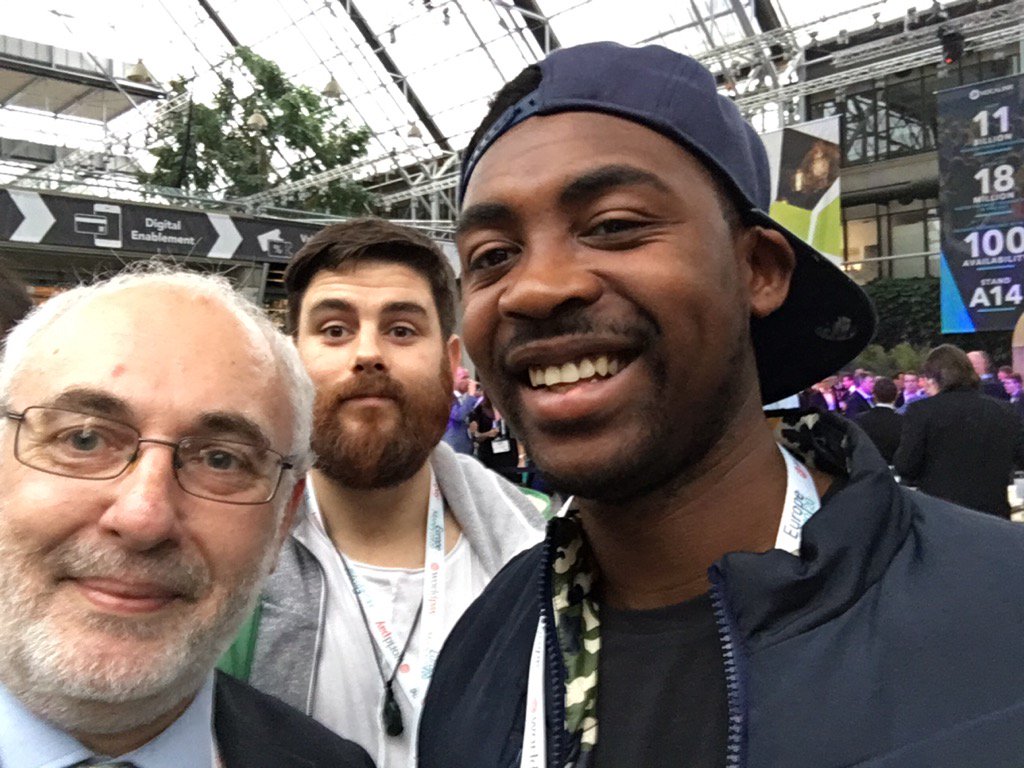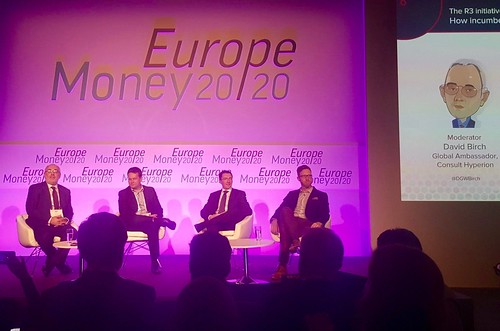I have to say that I walked out of the inaugural Money 2020 Europe conference last week feeling rather smug. The reason for this unbecoming bout of self-satisfaction is that I was one of the people who lobbied the organisers of the event to stage it in Copenhagen! Boy, was this the right decision. The event had a few teething troubles, as they all do, but overall my response to it (and the overwhelming response of the majority of the delegates that I spoke to) was that it was an absolutely superb event that has already changed the landscape for fintech events in Europe for good. I take my hat off to the organisers for doing such a great job in creating an event with a European feel that was distinct from, yet complementary to, the Las Vegas event that spawned it.
The venue was superb. The AC Bella Sky is apparently the largest hotel in Scandinavia. I loved the rooms, I loved the layout (especially the central atrium which meant that everybody bumped into everybody else during the course of the event), I loved it is on a Metro line into the city, I loved that it is only a few minutes from the airport by taxi, I loved the organisation, I loved the food and (speaking from a business point of view) I loved the fact that a great many of our clients were there. I will definitely be going again next year and you probably should too.
The way the event was configured was with a general session area that included the main stage and seating for umpteen thousand people (I had the great privilege of interviewing Google on the main stage to talk about their plans for Android Pay in Europe and thoroughly enjoyed the experience), then five session areas for the parallel tracks. The session areas were next to each other, so that you can wander between them if you found that the session you were in was quite what you were looking for or if someone else texted you “hey come and check out this presentation”, and next to the speakers lounge which made it super convenient for people like me to have meetings at the event as well as having somewhere quiet to sit now and then to have a coffee and catch up on email.
A fireside chat about Android Pay with Spencer Spinelli, Director of Emerging Platforms at Google, on the main stage.
The key themes of the event have been summarised nicely by Business Insider so there’s no need for me to step through the agenda and point you in the direction of the key announcements from Alipay, Amazon, R3, Google and many others. But I thought it might be mildly useful to explain why I found a few of the themes of the event particularly interesting and what they might mean for some of our clients. I’ve picked out three themes to explore. The first comes under the general heading of block chain, which was everywhere at the event. The second comes under the general heading of alternative payments. The third of was regulation.
Panel discussion on the R3 initiative with Alex Batlin, Richard Brown, and Simon Taylor.
The blockchain first. There were a number of sessions about the block chain. I chaired one of them, which featured Richard Brown from R3, the consortium of 40+ international banks developing shared ledger technology for financial services, along with two of their member banks (UBS and Barclays). Blockchain was everywhere even if an awful lot of the delegates weren’t actually sure what it was. The head of Digital Asset Holdings, famous investment banker Blythe Masters flew into talk on the main stage and said that blockchain will be deployed in financial services in two years and could save 30-40% of post-trade costs, the famous venture capitalist Michael Moritz said blockchain wasn’t worth the hype and various other people said that blockchain would/would not (* delete where applicable) revolutionise everything. But I couldn’t help noticing that even the sessions that weren’t about the blockchain had almost inevitable mention of the technology, which must mean something! What I don’t know. But I think it’s relevant to note that R3’s landmark announcement of their “Corda” platform was about shared ledger technology that is not a blockchain. A blockchain is only one form of shared ledger, remember, and the Bitcoin blockchain is only one form of blockchain.
There were a number of interesting payments announcements at the conference. It must mean something that Bitcoin wallet Circle has got an electronic money licence and a deal with Barclays, although again I’m not sure what. I didn’t really hear anything revolutionary in the world of cards. My colleague Tim Richards moderated the tokenisation panel, and I was involved in a number of meetings about tokenisation, which is a very important to us, but now it’s all about building and delivering tokenisation platforms and services rather than inventing any new. I did hear a very clear message from Amazon announcing their Amazon Payments Partner Programme. Patrick Gauthier from Amazon is someone I always take very seriously in the world of payments, so I see Amazon Payments as a serious challenge to PayPal and other wallet providers. There was also a very loud and clear message from Alipay announcing their expansion into Europe. In fact I thought the presentation from Alipay was the best one I saw at the event (I should make it clear that I didn’t see all of the presentations) as it was impressively focused. Sabrina Peng, President of Alipay International took the audience through just what kind of service Alipay would be delivering to European merchants who wanted to sell to Chinese customers and easily won the contest for the best sound bite of the event, saying that their "merchants didn’t want more payment systems, they want more customers". I intend to use this as a standard bumper sticker in all of my presentations about payments for the foreseeable future.
There were some discussions about regulation but I think that I detected the emergence of “regtech” as a distinct from “fintech” as a paradigm and organising principle. Fintech investment seems to be cooling and the money men are beginning to sniff around for what’s next. I spoke to a few people about this during the course of the sessions and it seems to me that for many of the financial services delegates their number one problem, the place where costs are out of control and apparently growing without limit, is compliance. There is great new technology out there but that new technology can’t help unless it has a regulatory context in which to flourish. The idea that there might be new categories of technology (and actually I think that the shared ledger might be one of them because of its potential for a new kind of transparency and a regulatory win-win) where the impact is to reduce the cost of complying with regulation rather than to reduce the cost of delivering a functional service sounds rather interesting and is likely to be a bigger focus of next year’s event.
In this context, I thought that some very good points were made at the lunch sponsored by VocaLink that I attended on the second day. The lunch was “Chatham house” so I can’t say who said it, but as the discussion on payment regulation in the UK evolved, more than one person made the point that the U.K.'s new Payment Systems Regulator (PSR) did not appear to have any kind of economic strategy beyond utility competition. I agree with this and I am hopeful that a productive dialogue with the regulator might serve to match up the wider socio-economic goals for the payment system (reducing the overall total social cost of payments, for example) with the potential offered by new technology to transform the sector, not to simply add competitors doing the same thing. There was also a lively discussion about the nature of regulation. I am strongly in favour of regulating for outcomes, not by technology. There is a difference between forcing London taxis, for example, to have contactless terminals and forcing them to offer cashless payments. After all, customers don’t want more payment systems, you might say, but more convenience.
Elsewhere there was a lot of talk about partnerships, as the fintechs begin to work with the banks, and also a lot of talk about PSD2 and APIs (with top, top players like Shamir Karkal from BBCA and Alex Mifsud from Ixaris explaining why this will be a big shift in the delivery of banking services) although that seemed less innovative to me as we’ve been talking about this kind of thing with our clients for a long time. There was some talk about AI and robo-advice . There wasn’t much talk about wearables (there seemed to be more interest in this whole area at Mobile World Congress earlier in the year) or about about cars or beacons, except over at the WorldPay stand where you could see the brilliant demos that Consult Hyperion built for them!
Well, that’s enough work. It’s time to head off and party with Rudimental. I had a nice chat with them about the use of the Payment Account Reference (PAR) and the generation of closed-loop EMV tokens as a means to deliver efficient ticketing and payment solutions in an event context (not).

Rudimental were the stars of the Tuesday night party.
There are three companies I particularly want to thank for their efforts during the week. The first is VocaLink for laying on the lunch that I mentioned earlier, the second is Google for letting me into their VIP area for the Tuesday night party (which was great fun) and the third is ACI worldwide for the smoothie bar that they set up in the exhibition area. I have no idea what it cost, but since everyone was choosing the smoothie bar as the location for meetings it meant that our good friends over at ACI got to chat to a lot of people and good for them!

Comments
Post a Comment